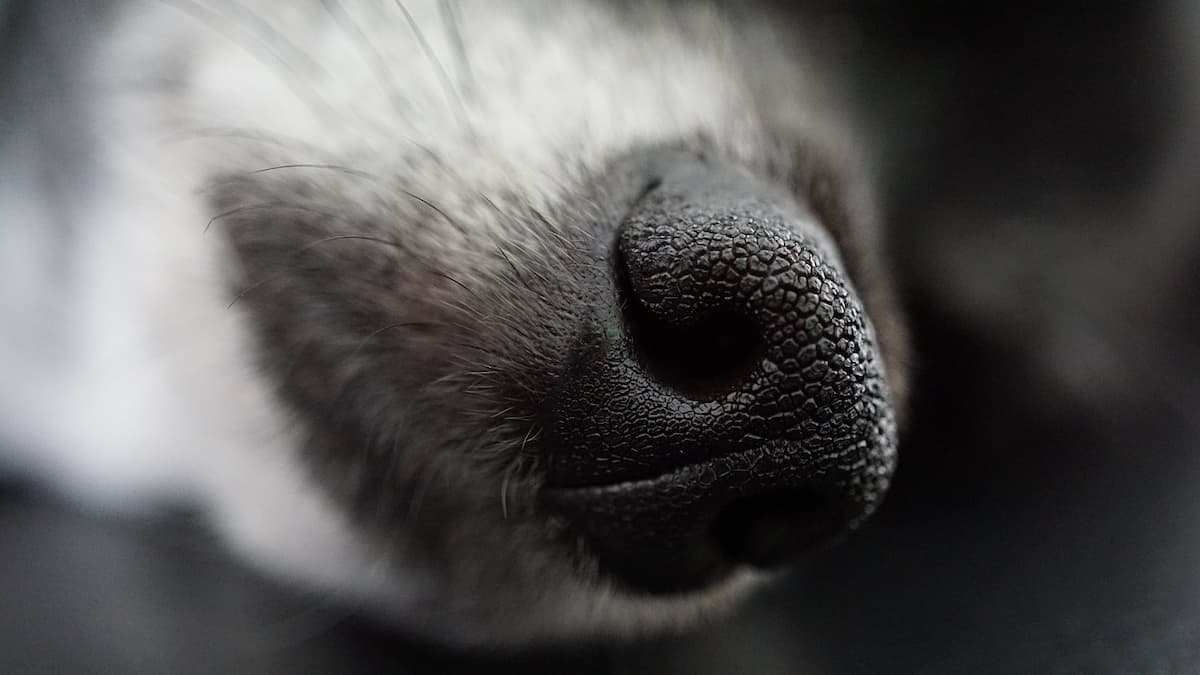Have you ever noticed that your furry friend, your loyal companion, suddenly develops a runny nose?
It’s quite a common occurrence and often leaves us dog owners perplexed.
Whether you’ve wondered if allergies, infections, or something else entirely could be the culprit, read to find out the answers to your questions.
Understanding the Causes and Symptoms About Dog’s Runny Nose
Dogs, like humans, are susceptible to a range of health issues, and one common problem they experience is a runny nose.
If you’ve noticed your furry companion experiencing a steady flow of nasal discharge, it’s important to understand the potential causes and symptoms associated with this condition.
By gaining insight into why dogs get runny noses, you’ll be better equipped to determine if your pup needs veterinary attention or if it can be resolved at home.
Identifying Common Viral and Bacterial Respiratory Issues
While there are various reasons for a dog to have a runny nose, infections caused by viruses and bacteria are among the most common culprits.
Viral respiratory infections, such as the canine distemper virus or the canine influenza virus, can lead to a runny nose in dogs.
These viruses can easily spread from one dog to another, especially in environments where canines frequently come into close contact, such as dog parks or boarding facilities.
It’s important to note that not all viral infections will present with just a runny nose, as other symptoms may also be evident, such as coughing or sneezing.
Bacterial respiratory infections, on the other hand, can also cause a dog’s nose to run.
These infections are often caused by bacteria like Bordetella bronchiseptica, which is a common culprit in kennel cough.
Dogs with bacterial respiratory infections may exhibit other symptoms as well, including a persistent cough and lethargy.
If you notice that your furry friend has a runny nose accompanied by any of these symptoms, it’s crucial to seek veterinary attention for a proper evaluation and treatment.
Tips for Managing Your Dog’s Seasonal Runny Nose
Allergies are not just limited to humans; dogs can also suffer from allergies that cause a runny nose.
Pollen, dust mites, and mold spores are some common allergens that can trigger an allergic reaction in dogs.
Just like us, dogs can be allergic to pollen from various plants and trees.
When your furry friend comes into contact with these allergens, their immune system can go into overdrive, causing a runny nose and other allergy symptoms.
It’s important to note that different dogs may be allergic to different types of pollen, so it’s helpful to pay attention to the specific times of year when your dog’s runny nose tends to act up.
Dust mites can also irritate a dog’s nasal passages, leading to sneezing and a runny nose.
Additionally, mold spores, often found in areas with high humidity or dampness, can cause similar symptoms in our four-legged companions.
If you notice that your dog’s runny nose is more persistent indoors or in specific outdoor environments, it could be a sign that they are allergic to something in their surroundings.
It’s always a good idea to consult with your veterinarian to determine the exact cause of your dog’s allergies and develop an appropriate management plan.
In addition to allergies, dogs can also experience a runny nose due to irritants such as cigarette smoke, household cleaning products, and strong perfumes.
These irritants can cause inflammation and irritation in a dog’s respiratory system, leading to a runny nose.
If you’re a smoker or use strong chemicals around your pet, it’s important to be aware of the potential effects these substances can have on their sensitive noses.
Avoid exposing your dog to these irritants as much as possible.
How Cold Temperatures Can Impact Your Dog’s Nasal Health
Another one of the primary reasons dogs may get a runny nose in cold weather is because of the dryness in the air.
Just like humans, dogs’ nasal passages can become dry and irritated when exposed to arid cold air.
This dryness can lead to a runny nose or even a nosebleed in some cases.
Additionally, the lower humidity levels during winter can also make it harder for dogs to retain moisture in their noses, exacerbating the issue.
Another factor that can contribute to a runny nose in dogs during winter is the cold temperature itself.
When dogs are exposed to cold air, their bodies automatically try to warm up by constricting blood vessels in the nose.
This constriction reduces blood flow to the nasal tissues, causing them to become less efficient in trapping moisture and filtering out particles.
As a result, your dog’s nasal passages may produce excess mucus, leading to a runny nose.
To help your furry companion combat the cold weather woes, there are a few things you can do.
First and foremost, ensure that your dog has a cozy and warm shelter to retreat to when the temperatures drop.
Providing a comfortable bed, blankets, and maybe even a heated pad can help keep their body temperature regulated.
Additionally, you can consider using a humidifier indoors to add moisture to the air, which can help prevent dryness in your dog’s nasal passages.
Lastly, be mindful of the length and frequency of your outdoor walks during cold weather, and try to avoid highly congested areas to reduce your dog’s exposure to potential irritants.
Natural Remedies and Treatment Options for Runny Nose in Dogs
When your dog has a runny nose, it’s important to provide them with relief and treatment options that are safe and natural.
One option is to use saline nasal drops.
These drops can help to loosen mucus and ease congestion in your dog’s nostrils.
To apply them, simply tilt your dog’s head back slightly, insert the dropper into their nostril, and squeeze a few drops into each nostril.
Gently massaging the area around the nostrils can also help to distribute the drops.
Another remedy to consider is steam therapy.
By creating a steamy environment, you can help to moisturize your dog’s nasal passages, which can provide welcome relief.
You can achieve this by running a hot shower and allowing your dog to sit in the bathroom for a few minutes while they breathe in the moist air.
In addition to these natural remedies, it’s important to address the underlying cause of your dog’s runny nose.
If you suspect an infection, it’s best to consult with your veterinarian, who can prescribe appropriate medication if necessary.
Likewise, if you suspect allergies or an obstruction, your vet can carry out the necessary tests and perform any procedures needed to alleviate your dog’s symptoms.
Remember, always consult with a professional before attempting to diagnose or treat your pet’s health issues.
With the right care and attention, your furry friend will be back to their usual playful self in no time!
FAQ
Q: Is a runny nose in dogs similar to what we experience?
A: Absolutely!
While dogs can’t grab a tissue and blow their noses like we do, they do have their version of this annoyance.
Runny noses in dogs occur when the nasal passages become irritated or infected, leading to the excessive production of mucus.
Q: What can cause a dog’s runny nose?
A: Several factors can contribute to a dog’s runny nose.
It could be something as minor as allergies to pollen, dust, or certain foods. Infections like the common cold or flu can also trigger a runny nose in dogs.
Plus, environmental factors such as cold weather or exposure to irritating chemicals can play a role too.
Q: How can I tell if my dog has a runny nose?
A: Keep an eye out for those telltale signs!
If you notice your furry buddy constantly licking or rubbing their snout, sneezing frequently, or having a wet or dripping nose, chances are they have a runny nose.
Q: Are certain breeds more prone to having runny noses?
A: Interestingly, yes!
Brachycephalic breeds (dogs with a pushed-in face like Bulldogs or Pugs) often have narrower nasal passages, making them more susceptible to runny noses.
However, it’s essential to remember that any dog can experience this pesky issue regardless of their breed.
Q: Should I be concerned if my dog has a runny nose?
A: Well, it depends!
If your dog’s runny nose is accompanied by other worrying symptoms like loss of appetite, lethargy, coughing, or nasal discharge that appears discolored or bloody, it’s best to consult a veterinarian
They’ll be able to determine if your pup needs medical attention or if it’s just a passing phase.
Q: Can I treat my dog’s runny nose at home?
A: In most cases, mild episodes of runny noses in dogs can be managed at home.
You can try keeping the environment clean and free of irritants, such as dust or strong chemicals.
Ensure your pup drinks plenty of water to help thin out the mucus.
However, remember that it’s always wise to seek professional advice if you’re unsure or if symptoms worsen.
Q: How can I prevent my dog from getting a runny nose in the first place?
A: While it’s impossible to completely prevent a dog from ever getting a runny nose, you can minimize the chances.
Regular vaccinations and keeping your dog away from sick canines can help prevent infectious causes.
Additionally, ensuring a clean and hygienic environment, providing a balanced diet, and keeping your dog away from known allergens can also contribute to a healthier sniffer.
Q: Is a dog’s runny nose ever contagious to humans?
A: Fortunately, most runny noses in dogs are not contagious to humans.
However, there are certain conditions, like the canine influenza virus, that can pass between dogs and humans in rare cases.
It’s always good practice to wash your hands after handling a dog with a runny nose, just to be safe.
Q: Can a dog’s runny nose go away on its own?
A: Absolutely!
Just like with humans, often a dog’s runny nose will clear up on its own within a few days.
But if it persists or worsens, always remember that seeking veterinary advice is the best course of action.
Remember, our furry pals are not so different from us when it comes to those runny noses.
With a little care and attention, we can help them sniff their way back to health!
To Sum It Up
From allergies to infections, irritants to the weather, it’s essential to keep a watchful eye on your dog’s health.
If you notice your pooch with a runny nose, be sure to monitor any other symptoms they may be displaying and consult with your veterinarian if necessary.
Remember, prevention is key!
Maintaining good hygiene, keeping your dog’s environment clean, and ensuring they receive regular check-ups can go a long way in preventing any nasal issues.
And of course, don’t forget about proper nutrition, exercise, and lots of love!
So next time you find your adorable pup with a runny nose, don’t panic!
Take a moment to consider the possible causes we discussed today.
With your love and care, along with the help of veterinary professionals, your furry companion will be back to wagging their tail and sniffing their way through life in no time.














